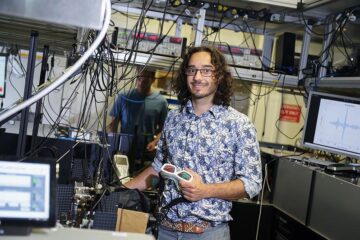Siemens and RWE build next-generation virtual power plant

Today's virtual power plants already transmit their electricity from software-bundled, distributed power generating facilities to the energy markets. But a cost-effective, mass-market solution for integrating producers, consumers and storage units does not yet exist.
Siemens and RWE are tackling this challenge with the RWE Smartpool project, in which they are jointly building the next generation of an IT system for connecting a large number of distributed energy resources. In doing so, they are bundling distributed energy resources on a future-oriented technology platform.
The two partners want to expand the successful collaboration they've had in recent years with a new cooperation agreement aimed at generating interest for the RWE Smartpool project among new market participants, such as utilities and grid operators, and convincing them to use this new platform.
The new system will significantly increase performance by bundling a large number of distributed energy resources. It will also expand the ways in which distribution grid operators can integrate distributed power generating facilities – and, in particular, renewable energy sources – for example to further optimize grid stability as the requirements become increasingly more complex.
In the RWE Smartpool project, RWE will use Siemens technology to build a system that makes it possible to connect a large number of parties in distributed energy resources, such as generators, consumers (loads) and storage units, to the IT system in a way that is both suitable for the mass market and can handle multiple clients.
This new technology platform will be built as an energy information and control system and will provide, among other things, important functions for distribution grid operators against the backdrop of the energy transition to the new energy mix. In the future, RWE Smartpool is also expected to support the structuring between market participants and the grid in line with the traffic light concept of the BDEW industry association.
Dr. Joachim Schneider, CTO of RWE Deutschland AG, welcomes the cooperation with Siemens. „Many innovative steps must be taken in order to successfully manage the energy transition to the new energy mix. By collaborating with Siemens, we will be able to significantly expand the benefits of new IT technology systems and thus provide customers and grid operators with efficient solutions for their business.“ As a result, public works and grid operators will be able to use RWE Smartpool to optimize the marketing of what are frequently small amounts of locally generated electricity.
Siemens will license its DEMS decentralized energy management system for the project. The system is based on EnergyIP, Siemens' highly scalable platform for smart grid applications. „With this technologically leading system, RWE will be well equipped to meet the challenges of an increasingly digitalized energy world,“ said Thomas Zimmermann, CEO of the Digital Grid Business Unit within the Siemens Energy Management Division.
Siemens AG (Berlin and Munich) is a global technology powerhouse that has stood for engineering excellence, innovation, quality, reliability and internationality for more than 165 years. The company is active in more than 200 countries, focusing on the areas of electrification, automation and digitalization. One of the world's largest producers of energy-efficient, resource-saving technologies, Siemens is No. 1 in offshore wind turbine construction, a leading supplier of gas and steam turbines for power generation, a major provider of power transmission solutions and a pioneer in infrastructure solutions as well as automation, drive and software solutions for industry. The company is also a leading provider of medical imaging equipment – such as computed tomography and magnetic resonance imaging systems – and a leader in laboratory diagnostics as well as clinical IT. In fiscal 2015, which ended on September 30, 2015, Siemens generated revenue of €75.6 billion and net income of €7.4 billion. At the end of September 2015, the company had around 348,000 employees worldwide. Further information is available on the Internet at www.siemens.com
RWE Deutschland AG headquartered in Essen is responsible for the German activities of the RWE Group in the areas grid, distribution and energy efficiency, and it controls the German regional companies. The company has autonomous subsidiaries for distribution, the running of the distribution grid, metering and the sale of technical services. Other subsidiaries are responsible for activities relating to energy efficiency including electric mobility and for gas storage. It has a share in around 70 regional and municipal utility companies and has around 19,000 employees. For further information please see: http://www.rwe.com
Reference Number: PR2015110068EMEN
Contact
Mr. Dietrich Biester
Energy Management Division
Siemens AG
Freyeslebenstr. 1
91058 Erlangen
Germany
Tel: +49 (9131) 7-33559
dietrich.biester@siemens.com
Ms. Eva Wagner
RWE Deutschland AG
Tel: +49 (201) 12-23822
eva.wagner@rwe.com
Mr. Wolfgang Schley
RWE Deutschland AG
Tel: +49 (201) 12-20580
wolfgang.schley@rwe.com
Alle Nachrichten aus der Kategorie: Unternehmensmeldungen
Neueste Beiträge

Neue universelle lichtbasierte Technik zur Kontrolle der Talpolarisation
Ein internationales Forscherteam berichtet in Nature über eine neue Methode, mit der zum ersten Mal die Talpolarisation in zentrosymmetrischen Bulk-Materialien auf eine nicht materialspezifische Weise erreicht wird. Diese „universelle Technik“…

Tumorzellen hebeln das Immunsystem früh aus
Neu entdeckter Mechanismus könnte Krebs-Immuntherapien deutlich verbessern. Tumore verhindern aktiv, dass sich Immunantworten durch sogenannte zytotoxische T-Zellen bilden, die den Krebs bekämpfen könnten. Wie das genau geschieht, beschreiben jetzt erstmals…

Immunzellen in den Startlöchern: „Allzeit bereit“ ist harte Arbeit
Wenn Krankheitserreger in den Körper eindringen, muss das Immunsystem sofort reagieren und eine Infektion verhindern oder eindämmen. Doch wie halten sich unsere Abwehrzellen bereit, wenn kein Angreifer in Sicht ist?…





















